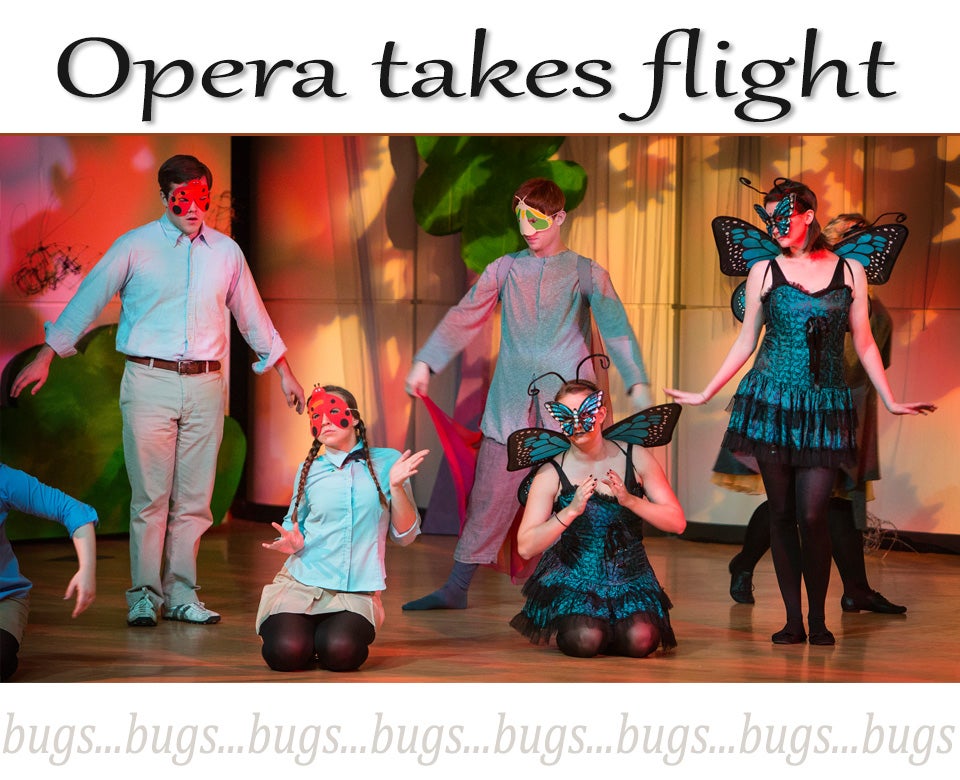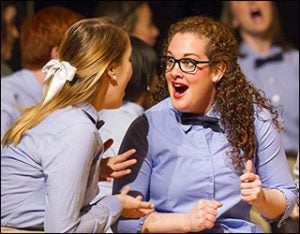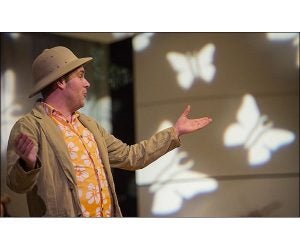‘Insectaphobia’ premiere engages young audience

Photography and video by Cliff Hollis and Jay Clark
Inspiration is abundant for composer Salvatore Macchia. “Bugs, bugs, bugs, bugs, insects – they’re all around us!” East Carolina University student performers sang from his script this week.
Macchia’s opera “Insectaphobia or Bug Off!” ran three nights in March as part of the 13th annual NewMusic@ECU Festival, which celebrates contemporary works of art and music. This is the first year the festival incorporated the world premiere of an opera. Written 15 years ago, “Insectaphobia” had been used in classrooms and workshops but never fully produced.
“I sat down at the piano and I opened (the opera) up in the middle…and I thought, ‘This is the piece (for the festival),’” ECU Opera Theater Director John Kramar said. “It spoke to me right off the bat.”
It was also a piece ECU could use to connect with a new – and much younger –audience. On March 27, nearly 200 sixth graders from C.M. Eppes Middle School in Greenville marched from their classrooms into Fletcher Recital Hall for a special daytime showing of “Insectaphobia.”
“We do, with the NewMusic Festival, try to reach into the community in as many ways as we can,” said Ed Jacobs, festival founder and director.
“This is a natural continuation of that effort. We are not able to do it every year…but this year, the composer…has spent hours at C.M. Eppes (Middle School).”
“Insectaphobia” centers on a dying homeless woman, played by ECU School of Music faculty member Dr. Jami Rhodes. A parallel story involves a classroom full of young students learning about insects – “the most successful life form on the planet,” as the opera describes them. Their worlds collide as the story progresses, highlighting themes ranging from ecology to the importance of caring for people who fall on hard times.
Macchia met with the C.M. Eppes orchestra, band, and sixth grade classes during the week he spent in Greenville as a guest of ECU. Teachers received a guide to help draft “Insectaphobia”-related curriculum and the libretto, or opera script, in advance.

ECU School of Music sophomore voice performance majors Caroline Vaughn, left, and Sara McBrayer perform during the opera.
“I think that opera can have a…very strong impact on young children,” Macchia said. “The message of the work is universal…so it’s geared as much to adults as it is to children. If you let kids alone with it, most art affects children in the same way – if not more – than it does adults.”
Jane Austen Behan, director of arts education for Pitt County Schools, said it’s a one-of-a-kind experience for many young students.
“When students are given opportunities to experience any performing or visual art event, it sparks questions and curiosity,” Behan explained. “Opera is loaded with content from other curriculums. ‘Insectaphobia’ addresses standards in social studies, science, English language arts, guidance and music.
“For our students, opera becomes a laboratory of learning through active listening, observing, reflecting, and critical analysis,” she added.
The world premiere resulted from a collaboration of academic units. A class from the School of Art & Design sculpted wireframe bugs that adorned the stage, faculty and students in the School of Theatre and Dance designed costumes and the set, and a former School of Communication student documented the creation and execution of the performance.
Bringing “Insectaphobia” to life has also been a challenge and privilege for the ECU students involved in the production, said Kramar.
“(At first) the music seemed so difficult and challenging and daunting, and the students were wonderful at every step, embracing it and putting their all into it,” Kramar continued. “And then, several months later, to actually be able to meet the creator…and to realize he is a human being.
“We so often in classical music perform music by composers who are no longer alive or who are inaccessible to us. And here he was standing right there with them. It

East Carolina University students and faculty brought the world premiere of a new opera – “Insectaphobia or Bug Off!” – to life at Fletcher Recital Hall in performances March 24-27. The opera was featured as part of the annual NewMusic@ECU Festival.
was a fascinating experience for them to see the composer at work.”
But Macchia insists the pleasure was his.
“Having an opera performed – to have it learned, have it staged, have it set and have it done so well – is such a profound gift,” Macchia said. “I really hope that what people have gotten from learning it and working on it, and what audiences may get from attending a performance of it, is an eighth of what I’m getting from the experience of having this happen. It’s a really big, important thing in my life.”
“I think that opera can have a…very strong impact on young children,” Macchia said. “The message of the work is universal…so it’s geared as much to adults as it is to children. If you let kids alone with it, most art affects children in the same way – if not more – than it does adults.”
Jane Austen Behan, director of arts education for Pitt County Schools, said it’s a one-of-a-kind experience for many young students.
“When students are given opportunities to experience any performing or visual art event, it sparks questions and curiosity,” Behan explained. “Opera is loaded with content from other curriculums. ‘Insectaphobia’ addresses standards in social studies, science, English language arts, guidance and music.
“For our students, opera becomes a laboratory of learning through active listening, observing, reflecting, and critical analysis,” she added.
The world premiere resulted from a collaboration of academic units. A class from the School of Art & Design sculpted wireframe bugs that adorned the stage, faculty and students in the School of Theatre and Dance designed costumes and the set, and a former School of Communication student documented the creation and execution of the performance.
Bringing “Insectaphobia” to life has also been a challenge and privilege for the ECU students involved in the production, said Kramar.
“(At first) the music seemed so difficult and challenging and daunting, and the students were wonderful at every step, embracing it and putting their all into it,” Kramar continued. “And then, several months later, to actually be able to meet the creator…and to realize he is a human being.
“We so often in classical music perform music by composers who are no longer alive or who are inaccessible to us. And here he was standing right there with them. It was a fascinating experience for them to see the composer at work.”
But Macchia insists the pleasure was his.
“Having an opera performed – to have it learned, have it staged, have it set and have it done so well – is such a profound gift,” Macchia said. “I really hope that what people have gotten from learning it and working on it, and what audiences may get from attending a performance of it, is an eighth of what I’m getting from the experience of having this happen. It’s a really big, important thing in my life.”